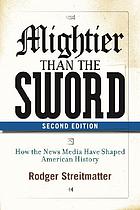Mightier Than the Sword
Although you might not be able to tell from my last few posts, I do read books that aren't recommended by my grandmother or feature the Wakefield twins of Sweet Valley.
 The other night I finished "Mightier Than the Sword: How the News Media Have Shaped American History," by Rodger Streitmatter. From the American Revolution to the present day, the author discusses times when print and broadcast sources have had an influence on the history and course of the country. He mentions examples of the media both hurting and hindering the progress of the country -- when the media have encouraged politicians to effect change and when the institutions have done little more than regurgitate what government or businesses have said.
The other night I finished "Mightier Than the Sword: How the News Media Have Shaped American History," by Rodger Streitmatter. From the American Revolution to the present day, the author discusses times when print and broadcast sources have had an influence on the history and course of the country. He mentions examples of the media both hurting and hindering the progress of the country -- when the media have encouraged politicians to effect change and when the institutions have done little more than regurgitate what government or businesses have said.
I found the book got more interesting with the introduction of radio, television and the Internet. The different situations in which new forms of media were involved proved that one could no longer hide behind text that was not transmitted instantaneously.
Some might say the book has a liberal bias; but some also say the media have a liberal bias. But the book mostly reminded me of why I went into journalism in the first place. The ability to correctly portray a series of events, expose wrongs and analyze actions can change the course of the country.
-- Cheryl Sadler
CSadler@News-Herald.com
 The other night I finished "Mightier Than the Sword: How the News Media Have Shaped American History," by Rodger Streitmatter. From the American Revolution to the present day, the author discusses times when print and broadcast sources have had an influence on the history and course of the country. He mentions examples of the media both hurting and hindering the progress of the country -- when the media have encouraged politicians to effect change and when the institutions have done little more than regurgitate what government or businesses have said.
The other night I finished "Mightier Than the Sword: How the News Media Have Shaped American History," by Rodger Streitmatter. From the American Revolution to the present day, the author discusses times when print and broadcast sources have had an influence on the history and course of the country. He mentions examples of the media both hurting and hindering the progress of the country -- when the media have encouraged politicians to effect change and when the institutions have done little more than regurgitate what government or businesses have said.I found the book got more interesting with the introduction of radio, television and the Internet. The different situations in which new forms of media were involved proved that one could no longer hide behind text that was not transmitted instantaneously.
By covering the (Civil Rights) Movement's various events, TV news awakened people throughout the country to the realities of black oppression in the South. By pushing those realities into the face of the American people everywhere, television news propelled the Civil Rights Movement into the American consciousness and onto the national agenda ...
As the TV cameras showed blacks being cursed, spit upon, attacked by police dogs and blasted with firehoses merely for trying to exercise the rights that were guaranteed to them by the Constitution, those images became imbedded into the nation's consciousness. (p. 174-175)
Some might say the book has a liberal bias; but some also say the media have a liberal bias. But the book mostly reminded me of why I went into journalism in the first place. The ability to correctly portray a series of events, expose wrongs and analyze actions can change the course of the country.
-- Cheryl Sadler
CSadler@News-Herald.com
Labels: journalism
 RSS
RSS

0 Comments:
Post a Comment
Subscribe to Post Comments [Atom]
<< Home